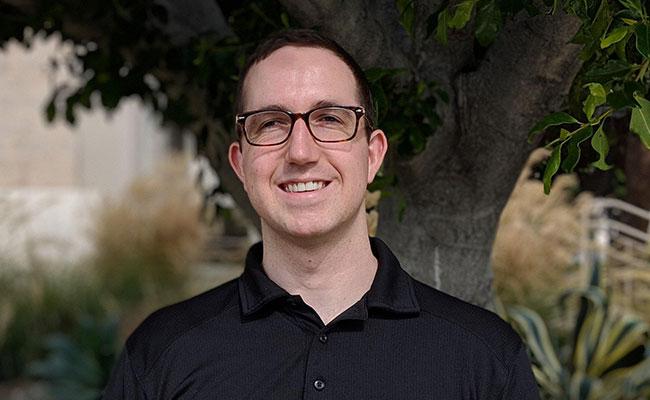Interview With Chris Jansen, Design Engineer
Developing sustainable systems to meet stormwater management demands

Chris Jansen studied water resources engineering and hydrology at University of California, Los Angeles and Stanford University. He has a master’s degree in Civil and Environmental Engineering from Stanford University, where his studies focused on environmental fluid mechanics and hydrology. He recently passed the national PE exam and is currently preparing for the California-specific exams. Chris also served four years in the Marine Corps as a Landing Support Specialist, which is in the logistics field, and completed two tours in Afghanistan. We talked with Chris as part of our #TtInspires campaign celebrating the passion of Tetra Tech employees. Follow #TtInspires on social media for more stories.
Chris is a design engineer with a focus on stormwater management and designing systems to manage the quality and quantity of stormwater conveyed through storm drains. This ultimately reduces pollution to rivers, lakes, and oceans. These stormwater management projects often include stormwater reuse components, which are essential in dry areas like Southern California.
What inspired you to join Tetra Tech?
When I was nearing the end of my master’s program at Stanford, I attended an American Society of Civil Engineers (ASCE) showing of the film Dream Big: Engineering Our World. At the event, I had a conversation with one of the attendees who worked in the water resources field. I discussed my career interests with her and explained that I was looking for work post-graduation. The attendee recommended a few different companies for me to look into, including Tetra Tech. I was very impressed with the breadth of projects that Tetra Tech is involved in and that the company has been ranked #1 in Water by Engineering News-Record magazine since 2004.
I applied to several opportunities at Tetra Tech throughout Southern California and Northern California and was hired by Tetra Tech’s site development and transportation group in the summer of 2017. One thing I like about Tetra Tech is even though we are a really big company, we work in smaller teams. When I met the group that I am currently working with, I could see there was a good variety of experience and expertise from entry-level and up. Since my group is smaller, I have opportunities to gain a lot of hands-on experience and work on some challenging tasks and projects.
What is the most inspirational project you have worked on at Tetra Tech?
Caruthers Park Stormwater and Urban Runoff Capture Project in Bellflower, California, is inspirational to me. California does not have rain all year, so the project is not always capturing stormwater. Most of the year they will be capturing urban runoff from activities like people washing their cars. We are designing a system to divert water from a storm drain and flood control channel that drains about 3,000 acres of land. The system is designed to collect this water, store it underground, treat it, and reuse it for on-site irrigation. In doing this, we are conserving around 16 million gallons of water per year for reuse. The project infiltrates excess captured water to recharge the groundwater aquifers.
I like this project because it helps the environment by reducing the amount of pollutants being discharged to the ocean, increasing local freshwater resources, and reducing the park’s demand for recycled wastewater resources. I have the chance to work on highly technical portions of the project, and I am expanding some of the things I learned in school, such as designing pipelines, pump stations, and reservoirs. Seeing the project from start to finish is exciting. The design started around the same time I joined Tetra Tech, and we are about to go into construction phase, now I will go out in the field to see the progress.
What do you do outside of your work that you think makes a difference for today’s environment?
I like to do a lot of little things to help the environment. I donate to environmental organizations and try to reduce my environmental footprint at home. I recycle, re-use plastic bags, use a water filter instead of water bottles, and try not to leave the water running. In the military overseas, they made us take short showers because of the water shortage, but it was only after working on projects at Tetra Tech that I really understood why. I volunteer by doing beach cleanups and picking up trash from trails, and I volunteer for Habitat for Humanity. I also like to talk to people about the things I learned at Tetra Tech and in school about taking care of the environment. I think word of mouth is important.

